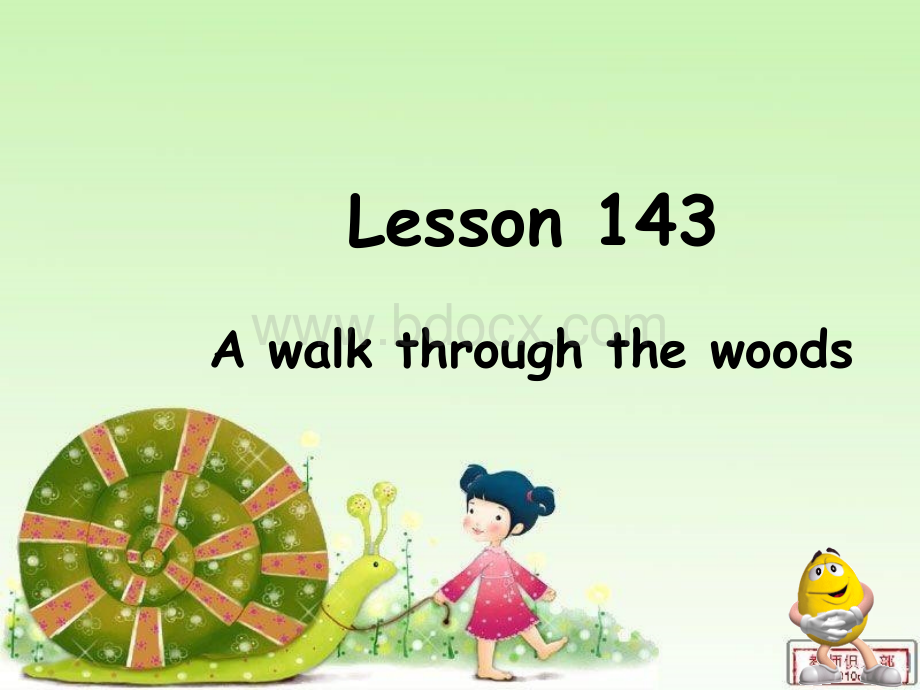新概念英语143--144课课件(已修).ppt
《新概念英语143--144课课件(已修).ppt》由会员分享,可在线阅读,更多相关《新概念英语143--144课课件(已修).ppt(43页珍藏版)》请在冰豆网上搜索。

Lesson143AwalkthroughthewoodsEverydayEnglishWherethereisawill,thereisaway.1.woodwdn.树林树林2.beautyspot风景点风景点3.hundredhndrd百百4.cityst城市城市5.visitorvzt参观者,参观者,游客游客6.litterlt杂乱的东西杂乱的东西9.rubbishrb垃圾垃圾8.piecepis碎片碎片7.litterbasket废物筐废物筐。
11.surroundsrandv.包围包围besurroundedby.被什么包围被什么包围12.placeplesv.放;放;n.地方地方13.countkantv.数,点数,点14.coverkvv.覆盖覆盖becoveredwith被被覆盖覆盖15.throwrv.扔,抛扔,抛threw;thrown16.prosecuteprskjutv.依法处置依法处置10.tyretap轮胎轮胎”17.tidytadadj.整齐的整齐的18.rustyrstadj.生锈的生锈的19.throughruprep.穿过穿过20.amongmprep.在在.之间之间课文讲解课文讲解Iliveinaveryoldtownwhichissurroundedbybeautifulwoods.Besurroundedby四周环绕着我住在一个四周围绕着高楼的地方。
Iliveinaplacewhichissurroundedbytallbuildings.我住在四周围绕着山的小村中。
Iliveinavillagewhichissurroundedbyhills.Itisafamousbeautyspot.Beautyspot,风景点OnSundays,hundredsofpeoplecomefromthecitytoseeourtownandtowalkthroughthewoods.hundredsof成百上千的成百上千的战士在这场战争中牺牲。
Hundredsofsoldiersdiedinthiswar.acrossoverthrough的用法区别的用法区别across:
横过,穿过横过,穿过,特指从一边到另一边,特指从一边到另一边e.g.1)Thebusiscomingacrossthebridge.2)Canyouswimacrosstheriver?
3)Thechildwillgoacrossthecrossroadsafterthelightturnsgreen.over:
越过,翻越过去越过,翻越过去e.g.1)Aftertheyclimbedoverthehilltheyfoundmanyflowersinthefields.2)Theycantclimboverthemountainiftheycantkeepgoing.through:
穿过穿过特指从某空间穿特指从某空间穿过过e.g.1)Thedeerisgoingthroughtheforest.2)Theballoonisflyingonandonthroughtheclouds.3)Jacksawmanystudentsplayingintheplaygroundthroughthewindow.Visitorshavebeenaskedtokeepthewoodscleanandtidy.Litterbasketshavebeenplacedunderthetrees,butpeoplestillthrowtheirrubbisheverywhere.LastWednesday,Iwentforawalkinthewoods.Goforawalk散步WhatIsawmademeverysad.句中的主语WhatIsaw是what引导的名词性从句(主语从句)。
那个小男孩所做的一切使他母亲十分惊讶。
Whatthelittleboydidsurprisedhismother.你所做的使我愉快。
Whatyoudomakesmehappy.Icountedsevenoldcarsandthreeoldrefrigerators.Thelittlebasketswereemptyandthegroundwascoveredwithpiecesofpaper,cigaretteends,oldtyres,emptybottlesandrustytins.becoveredwith.被.覆盖桌子上布满了灰尘。
Thedesksarecoveredwithdust.地上覆盖着雪。
Thegroundwascoveredwithsnow.PassiveVoice被动语态基本用法被动语态基本用法当句子的当句子的主语主语是动作的是动作的执行者执行者时,时,谓语的形式是谓语的形式是主动语态主动语态。
当句子的。
当句子的主语是动作的主语是动作的承受者承受者时,谓语要用时,谓语要用被动语态被动语态。
被动语态由助动词。
被动语态由助动词be+过去分词过去分词构成,时态通过构成,时态通过be表现出表现出来。
来。
1.Theymakeshoesinthatfactory.主语主语+及物动词及物动词+宾语宾语Shoesaremade(bythem)inthatfactory.一般现在时:
一般现在时:
S(主语)主语)+am/is/are+过去分词过去分词Hisbrotherwashesbowlseveryday.主主谓谓宾宾(受动者受动者)Bowlsarewashedbyhisbrothereveryday.改为被动语态TheyplayfootballonSunday.Lucydoesthehomeworkintheevening.Theyoftenusecomputersinclass.WemakethesemachinesinBeilun.PeoplespeakEnglishasthefirstlanguageinUK.FootballisplayedbythemonSunday.ThehomeworkisdonebyLucyintheevening.Computersareoftenusedbytheminclass.ThesemachinesaremadeinBeilun.EnglishisspokenasthefirstlanguageinUK.2.TheyboughttencomputerslasttermTencomputerswerebought(bythem)lastterm.一般过去时:
一般过去时:
S+was/were+过去分词过去分词Helookedafterthelittlebabyyesterday.主谓宾(受动者)Thelittlebabywaslookedafterbyhimyesterday.Theybuiltthetallbuildinglastyear.Hetookgoodcareofhislittlebrotheryesterday.Wecleanedourclassroomjustnow.Theyusedthisroomforresting.Theyplantedmanytreesyearsago.Thetallbuildingwasbuiltbythemlastyear.Hislittlebrotherwastakengoodcareofbyhimyesterday.Ourclassroomwascleanedbyusjustnow.Thisroomwasusedforrestingbythem.Manytreeswereplantedbythemyearsago.3.Theywillfinishtheworkintendays.Theworkwillbefinished(bythem)intendays.一般将来时:
一般将来时:
S+will+be+过去分词过去分词Tomwillcleantheroomtomorrow.主主谓谓宾宾(受动者受动者)TheroomwillbecleanedbyTomtomorrow.Wewillhaveasportsmeetingnextweek.Childrenwilltakesomephotosintheschoolyardtomorrow.Theheadmasterwillgiveatalkthisafternoon.Thefarmerswillgrowdifferentkindsofvegetablesnextspring.UncleWangwillmendtheTVsettomorrow.Asportsmeetingwillbehadbyusnextweek.Somephotoswillbetakenbychildrenintheschoolyardtomorrow.Atalkwillbegivenbytheheadmasterthisafternoon.Differentkindsofvegetableswillbegrownbythefarmersnextspring.TheTVsetwillbemendedbyUncleWangtomorrow.4AmycantakegoodcareofGinaGinacanbetakengoodcareofbyAmy.情态动词:
情态动词:
S+can/may/must/should+be+过去分词过去分词1.Hecantakecareofthebaby.2.Lucymaydrawthepictures.3.Youmustturnoffthelights.4.TheyshouldlearnEnglishwell.5.Jimcoulddoityesterday.Thebabycanbetakencareofbyhim.ThepicturemaybedrawnbyLucy.Thelightsmustbeturnedoffbyyou.Englishshouldbelearnedwellbythem.ItcouldbedonebyJimyesterday.被动语态中的特殊情况1.不及物动词带介词和介词宾语时,在变为被动语态时,仍然要带上介词。
e.g.Thestudentslistentotheteachercarefullyinclass.被动句:
Theteacherislistenedtocarefullybythestudentsinclass.e.g.Theylookafterthenewstudentsintheschool.被动句:
Thenewstudentsarelookedafterbythemintheschool.2.当动词带有复合宾语(有宾补),并且宾补是省去“to”的动词不定式时,在被动语态中应加上“to”e.g.Theymakeusdoallthework.被动句:
Wearemadetodoalltheworkbythem.e.g.Weoftenhearhersingsongs.被动句:
Sheisoftenheardtosingson